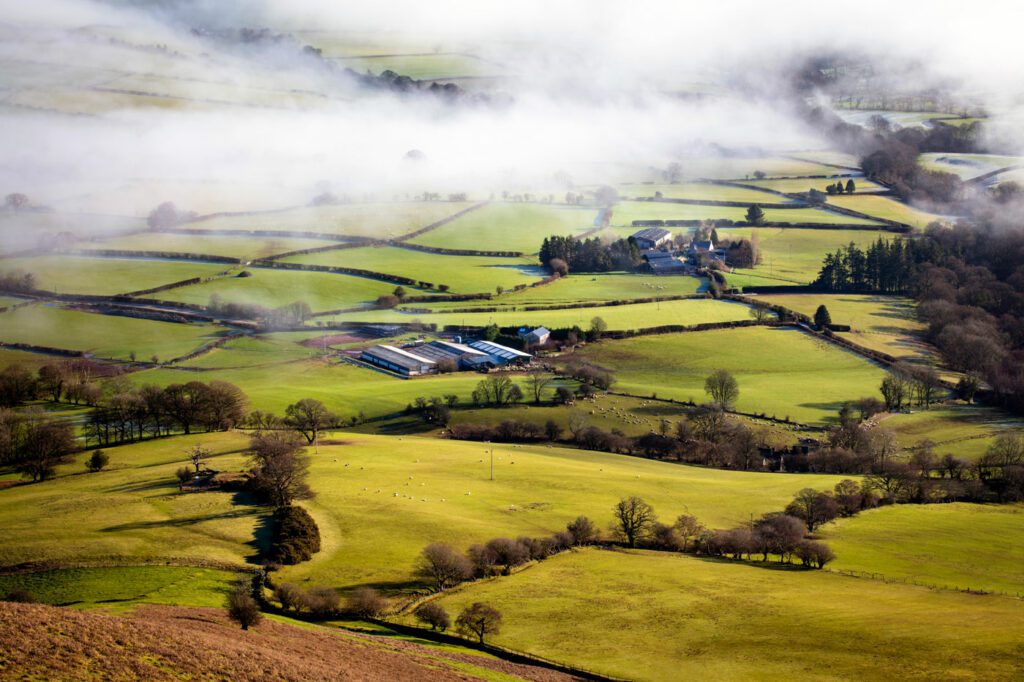Author
With the passing of the Agriculture (Wales) Act 2023 we now have the structure for the transition from the Basic Payment Scheme to a new Welsh subsidy scheme. Wales’s new agricultural policy is based upon Sustainable Land Management (‘SLM’); the answer to its delivery is the Sustainable Farming Scheme (‘SFS’).
We recently considered the key provisions of the Agriculture (Wales) Act 2023 and we now provide a summary of the SFS proposals which are due to come into effect in 2025.
The Welsh Government is yet to publish its final consultation on the SFS, which will consider in particular the final details for SFS, the transition period and stability payments. The consultation is due to be launched later this year.
Objectives
What we know so far is that farmers are intended to be able to undertake a range of ‘actions’ on their land which are linked to different ‘outcomes’ as a means to fulfilling the SLM objectives. Those are:
- Clean air
- Clean water
- Enhanced access and engagement
- High animal health and welfare
- Maximise carbon storage
- Mitigate flood and drought risk
- Protected natural landscapes and historical environment
- Reduced greenhouse gas emissions
- Resilient ecosystem
- Resource efficient
The Principles
In its first consultation, the Welsh Government sets out five principles that will guide the design of SFS. These are:
- We must keep farmers on the land
- Food production is vital for our nation
- We should help build a prosperous and resilient agriculture industry
- Future support should maximise SLM outcomes
- All farmers should be able to access the scheme
Scheme Structure
The scheme will have 3 layers:
1. Universal Actions
Actions that must be carried out by all farmers who want to join SFS.
This is the baseline for farmers and aims to provide the ‘building blocks’ to enable them to do more with their land, helping them to become more sustainable. It enables them to receive additional payments by carrying out optional and/or collaborative actions.
Whilst the payment calculation methodology is still to be assessed and will form part of the final consultation, what we do know is that farmers who undertake universal actions will receive a baseline payment, capital payments, technical support and access to tools, advice and guidance.
There are five ‘characteristics’ under which SFS actions will be grouped. They are:-
i. Resilient and productive farms
ii. Reduce, reuse and recycle inputs, nutrients and waste
iii. Reduce on farm emissions and maximise carbon sequestration
iv. Protect and enhance the farm ecosystem
v. Benefit people, animals and places
To receive the baseline payment, farmers will have to have to carry out proposed Universal Layer Actions which will be required under the five characteristics.
- All farmers will complete a self-assessment once a year against a minimum of the sector and industry KPIs (two per sector or three in total, whichever is higher).
- All farms will have the necessary biosecurity measures in place:
- Wash stations and disinfectant available for people to clean clothing, equipment and vehicles as they enter/exit farms and livestock areas.
- All enclosed land boundaries are secure to stop stock straying.
- There is a dedicated secure store for deadstock, which can be cleaned and disinfected. It is away from livestock, feed and water.
- Feed stores are secure to keep out wildlife and vermin.
- There is a pest control / management programme in place, which includes the responsible use of biocides.
- Farmers to carry out professional and farmer soil testing at Scheme entry and in time for contract renewal to include a combination of Nitrogen, Potassium, Phosphorous, Carbon and pH, a biological measure (eg eDNA, respiration counting ‘proxy’ species – earthworms), a physical assessment (eg infiltration rate, bulk density or Visual Evaluation of Soil Structure).
- Farmers to submit nutrient account and evidence covering Nitrogen, Potassium, Phosphorous, Carbon and pH.
- Farmers will be supported to collect, record and report data on Plant Protection Products use and complete an Integrated Pest Management assessment.
- Farmers will need to carry out actions, identified by working closely with their vet, through the ‘Animal Health Improvement Cycle’[1] and calculate and report the average amount of antibiotics used on the farm.
- Where peatland exists, farmers will need to manage it appropriately.
- Farmers will have at least 10% tree cover on their farm, managed in line with the UK Forestry Standard. This has caused widespread concern within the industry, and as a result, the Welsh Government are considering some flexibility with this requirement which will be considered further during the final consultation.
- Farmers will manage new and existing hedgerows in line with the hedgerow management cycle.
- To protect soil from erosion, farmers will need to establish a multi-species cover crop on all land which is uncropped over the winter.
- Farmers will need to actively manage at least 10% of their land to maintain and enhance semi-natural habitats. Where there is insufficient semi-natural habitat available, farmers will need to select actions to create permanent or temporary habitat features on other agricultural land.
- Have a fully developed and agreed management plan in place ready for implementation for protected sites under the farmer’s sole control.
- Farmers will have to restore and manage existing permanent wildlife ponds and/or create a number of temporary ponds (scrapes).
- Farms with historical environment features identified on their land will need to follow general guidance on how to manage them.
- Farmers will be required to complete a minimum level of learning, including on Health & Safety.
2. Optional Actions
Farmers have some flexibility in that they can choose which actions they undertake and how they undertake them in order to receive payment.
These higher-level actions will need to be tailored to each farm and/or specific land and will enable farmers to receive additional revenue and/or capital payments, technical support, access to advice and guidance.
3. Collaborative Actions
Carried out by multiple farmers (minimum 2) or land managers in a co-ordinated manner on a national, catchment or landscape scale. These are likely to involve joint projects and may involve those who are not part of the SFS. They are aimed at more specific priorities which will require flexibility in terms of deliverability as different actions may be required to capitalise on the benefits claimed on the land.
One of the examples given by the Welsh Government in their ‘Sustainable Farming Scheme Outline Proposals for 2025’ is ‘collaborating to develop supply chain opportunities through establishing producer organisations or co-operatives, collectively securing investment for infrastructure, or creating a unified brand for marketing and promotion’.
Farmers will receive revenue and/or capital payments, technical support and advice and guidance.
National Minimum Standards
Underpinning the actions are the National Minimum Standards (‘NMS’), consolidating the existing agricultural regulations into one piece of legislation. NMS will apply to all farmers and not just those joining SFS.
The AWA 2023 does not include provision for NMS so we are yet to see the extent of compliance which will be required by all farmers. NMS must be implemented in time for the introduction of SFS in 2025. The Welsh Government indicated in their ‘Agriculture (Wales) White Paper’ that they do not propose raising the current regulatory baseline.
Eligibility
It is proposed that an applicant for Universal and Optional Layers will be subject to the following criteria which must be satisfied throughout the duration of their SFS contract:
- They must be a farmer undertaking agricultural activities.
- They must be able actively to perform, at least the applicable Universal Actions throughout the duration of the contract.
- The agricultural land must be in Wales.
- They must farm a minimum of three hectares of eligible agricultural land.
Separate eligibility criteria will apply to Collaborative Layers given that it could involve land owners or managers who are not part of SFS.
The eligibility criteria are being considered further as part of the second phase of the Welsh Government’s ‘Co-design for a Sustainable Farming Scheme for Wales’.
Sustainability Review
Every farmer will have to complete a Sustainability Review online before being able to enter SFS. It will provide an entire farm assessment of ‘the economic, environmental and social aspects of the farm’ and will be used as the baseline for entry and as an ongoing monitoring tool to enable farmers to maximise the performance of their farm.
It is proposed that the Sustainability Review will require:
- Basic farm and land information (similar to the Single Application Form);
- Carbon Assessment; and
- Habitat Baseline Review.
SFS Contracts
SFS contracts for Universal and Optional Layers are expected to be for periods of up to five years.
SFS has been designed to operate on a five-year rolling basis. Flexibility will be permitted for tenancies which end during the contract period.
It will be interesting to see how the proposals develop once the Welsh Government has had the opportunity to consider the responses to its final consultation. But what is clear is that any farmers and land managers wanting to access the financial support of SFS are also going to have to take on the numerous and wide-ranging conditions and obligations required by the scheme.
[1] This is a pro-active process for improving how disease is prevented and controlled on a farm. The same AHIC process will be universal for every farm, but the specific actions carried out will be bespoke.

